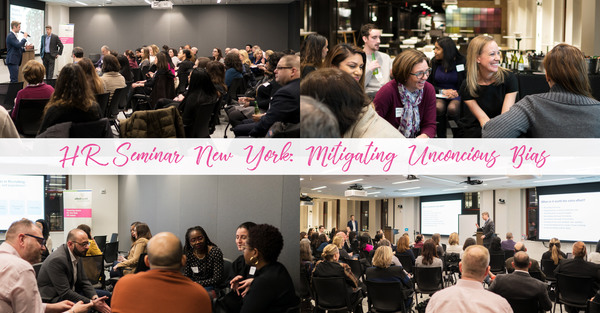
Drop off your CV
We serve the global HR community through our offices located in Delhi, Hong Kong, London, New York, São Paulo and Singapore and have placed HR leaders in over 30 countries.
On the 7th of March, sixty HR professionals gathered inside the iconic Empire State Building...

On the 7th of March, sixty HR professionals gathered inside the iconic Empire State Building for Elliott Scott HR New York's first seminar of 2019 in partnership with LinkedIn and Arcadia Consulting on ‘Mitigating Unconscious Bias’.
What is Unconscious Bias? We’ve all had that feeling after a first date where it’s ‘just not right’. Or that feeling of going to a string of apartment viewings and having the gut sense that you should keep looking. But are those feelings always valid? Often they are based on a set of preconceived notions about certain people that we form outside our own conscious awareness. If we question ourselves, we often find that there aren’t logical reasons behind those ideas. So how does unconscious bias affect us in the workplace? How can it affect our hiring and how can we be more aware of it? These were the questions posed in our most recent seminar.
Following an introduction from Stuart Elliott, CEO of Elliott Scott HR, Dan Spira, Arcadia Consulting’s Regional Director led us through a workshop where we were asked to think about how unconscious bias manifests in the workplace, and then encouraged to work through these issues in small groups. The key points from the session that stood out: Culture Fit – what does culture fit really mean, and can we overcome it? Often candidates will go through a series of interviews, their skills speaking for themselves, only to be rejected on the basis of ‘culture fit’. Perhaps they don’t look or sound like we want them to, perhaps they are different to what we’re used to. As recruiters we need to think long and hard about what ‘culture fit’ actually means for our organisation, in a tangible way, and not go off simple gut feelings that are based on unconscious bias.
Accessibility of Job Descriptions - are we doing everything we can to make roles accessible to a diverse range of candidates? Are we using inclusive language? Often requirements for certain jobs will discount entire demographics. For example, working parents will find it hard to be in a role that requires weekly travel. Questioning these requirements and deciding whether they are ‘must haves’ or ‘nice to haves’ is important, especially if you want to be reaching a more diverse range of people. Also look at the use of masculine vs feminine language in job advertisements. Are we unconsciously using masculine words when we advertise for leadership positions? Interview Slates – are we using them correctly? Let’s say a candidate goes through five rounds of interviews with five different people. In theory, this should mean we get five siloed and varied opinions, however this isn’t usually the case. Often we find that the colleagues interviewing the candidate will talk to each other. This seems harmless, but in truth, it’s often hard for interviewers to go into the room completely neutral, if they have already heard bad (or good) things from their team members. This was a key topic of discussion at the event, with participants coming to agreement that the interviewer should form their own opinion before consolidating feedback from other team members.
With such an interesting topic, the conversation flowed naturally and the evening closed with further networking over drinks and canapés where the guests mingled with the Arcadia, LinkedIn and Elliott Scott HR teams.
If you would be interested in attending any of Elliott Scott HR’s future events, follow us on LinkedIn and keep an eye on our events page.